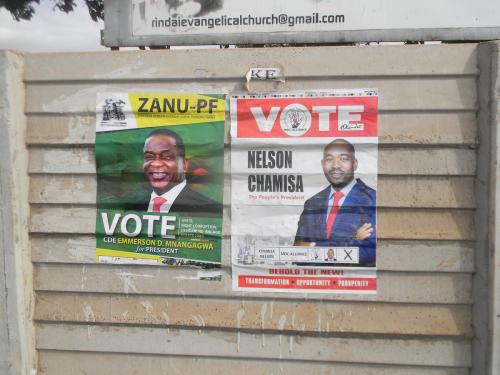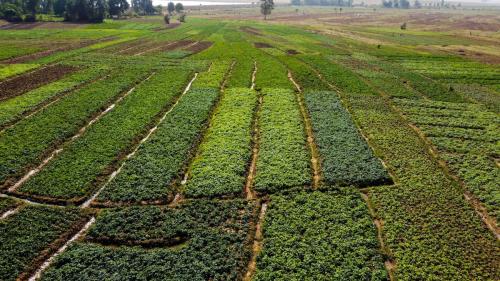China’s President Xi Jinping and India’s Prime Minister Narendra Modi continue Africa visit after productive BRICS summit
On Wednesday, July 25, South African President Cyril Ramaphosa opened the 10th summit of the BRICS countries (Brazil, Russia, India, China, and South Africa) in Johannesburg, South Africa. Following regular meetings among their countries’ ministers throughout the year, the annual BRICS summit serves as a platform for BRICS heads of state and government to affirm their joint commitments within the political bloc for the year ahead.
This year, the three-day summit was attended by Ramaphosa, Xi, Modi, Russian President Vladimir Putin, and Brazilian President Michel Temer and focused on the theme, “BRICS in Africa: Collaboration for Inclusive Growth and Shared Prosperity in the Fourth Industrial Revolution.” Notably, the summit included a BRICS-Africa Outreach Session, during which leaders from Angola, Gabon, Namibia, Rwanda, Senegal, Togo, and Uganda took part in dialogues with BRICS heads of state on the theme, “BRICS in Africa: Working towards the realization of the African Aspirations.” At the end of the summit, the BRICS leaders adopted the Johannesburg Declaration, which reaffirms principles of democracy, inclusiveness, and fights against unilateralism and protectionism.
During the high-level meetings on the BRICS countries’ core areas of cooperation—including economic issues, peace and security, and people-to-people exchanges—trade featured prominently, especially given rising trade tensions between the U.S. and China in recent months. On the summit’s opening day, Xi stated, “A trade war should be rejected because there will be no winner,” in reference to escalating threats from the U.S. In the Johannesburg Declaration, the heads of state agreed that, “the importance of an open world economy, enabling all countries and peoples to share the benefits of globalization, which should be inclusive and support sustainable development and prosperity of all countries.” Moreover, Ramaphosa commented during the BRICS Business Forum that “there’s also much scope to expand the value of trade between BRICS countries themselves. As a country that’s primarily an exporter of commodities to its BRICS partners, South Africa supports a shift towards complementary value-added trade.”
In other news, leading up to summit, Leaders Xi and Modi visited several African countries, during which they announced a slew of new investments in the region. Xi signed dozens of bilateral agreements in Senegal and Rwanda—although the exact value and content of the deals was not immediately made public. In South Africa, Xi pledged $14.7 billion in investment, $2.8 billion of which would be used to support the country’s struggling state utility company, Eskom. Following the BRICS summit, Xi will travel to Mauritius, a country with which China is currently negotiating a free trade agreement. Meanwhile, Modi announced that India would provide $200 million in loans for infrastructure and environmental projects in Uganda, provide $200 million in loans to Rwanda to develop industrial parks and build agricultural infrastructure, and open 18 new embassies across the continent over the next three years to supplement the 29 African missions already there.
South Sudan government and rebels sign power-sharing deal, again
On Wednesday, South Sudan’s government and the main opposition party signed a power-sharing deal in Juba, which they hope will end the country’s nearly five years of conflict. The agreement will be signed on August 5. It leaves President Salva Kiir as head of a transitional government while returning rebel chief Riek Machar to his previous position as first vice president. It also stipulates the government will include 20 ministers from Kiir’s government, nine from Machar’s group, and six from other political parties. The warring sides agreed to share a 550-seat parliament with 332 members from Kiir’s government, 128 from Machar’s group, and the rest from other groups. This new agreement comes as South Sudan’s leaders are under growing pressure from the international community to end the fighting – e.g., a threat of a U.N. arms embargo.
Many are pessimistic because this is not the first attempted power-sharing deal and a coalition of nine opposition parties have refrained from signing saying their suggestions for the deal were ignored. A similar deal dissolved in July of 2016 after fighting erupted Juba, and Machar left the country. This time around, the opposition claims they can “live with” the agreement, but state that it is destined to fail if security arrangements are not implemented in the early stages of the agreement.
Zimbabwe prepares for presidential elections
On Monday, July 30, Zimbabweans will head to the polls for presidential and parliamentary elections. The first presidential election since President Robert Mugabe’s departure from power last November will mark the first time in Zimbabwe’s history that the two main political parties are presenting new candidates: In the 38 years since independence, Robert Mugabe has consistently been a candidate—and won amid widespread controversy and criticism—the presidential elections in the country. There are 23 candidates for presidential elections and 50 parties offering candidates for parliamentary elections. Current President Emmerson Mnangagwa—who stepped in after Mugabe’s ouster last year—will represent ZANU-PF, the political party previously led by Mugabe. The opposition, the MDC Alliance, will be represented by Nelson Chamisa.
In his electoral promises, Mnangagwa, who also faces divisions within the ZANU-PF, pledges to break away from Mugabe’s contentious policies, lure investment into the country, and work with the World Bank and International Monetary Fund to solve the debt issue. Chamisa, Zimbabwe’s youngest electoral candidate at 40, also promised to break away from tradition, cut taxes, and reduce the government payroll, which presently absorbs 90 percent of national budget.
The path toward next week’s elections has been quite tumultuous: The opposition party alleges that the electoral commission is planning to rig the elections, though it ruled out boycotting next week’s elections. Last month, a grenade blasted through an election rally held by president Mnangagwa, killing two of his aides and injuring 50 people; the perpetrators have yet to be identified.
The Brookings Institution is committed to quality, independence, and impact.
We are supported by a diverse array of funders. In line with our values and policies, each Brookings publication represents the sole views of its author(s).





Commentary
Africa in the news: BRICS summit aftermath, South Sudan power-sharing agreement, and Zimbabwe election prep
July 28, 2018